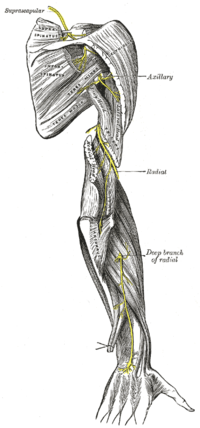
Photo from wikipedia
Objective: This prospective, randomized study aimed to compare anterior suprascapular nerve block versus interscalene block in terms of diaphragm paralysis in arthroscopic shoulder surgery. Methods: Fifty-two patients undergoing shoulder arthroscopy… Click to show full abstract
Objective: This prospective, randomized study aimed to compare anterior suprascapular nerve block versus interscalene block in terms of diaphragm paralysis in arthroscopic shoulder surgery. Methods: Fifty-two patients undergoing shoulder arthroscopy surgery were prospectively randomly assigned to interscalene block (n = 25) or anterior suprascapular nerve block groups (n = 27) (each group receiving 5 mL, 0.5% bupivacaine). The ipsilateral diaphragmatic excursion was assessed in all patients using ultrasound imaging before (baseline), 30 minutes, and 24 hours after block completion. Pain scores were recorded 1 hour preoperative, 30-60 minutes in the postoperative recovery unit, and at 6 and 24 hours postoperatively. Results: No complete paralysis was observed in either treatment group. The incidence of a partial decrease in diaphragm movements was significantly lower in the anterior suprascapular nerve block than in the interscalene block group (1 vs. 21 patients) (P < .01). Twenty-six patients in the anterior suprascapular nerve block and 4 in the interscalene block group had less than a 25% decrease in hemidiaphragmatic movements, 30 minutes after the blockade. Pain scores were similar in the 2 groups. However, mean pain scores at 24 hours postoperatively were significantly higher in the interscalene block than in the anterior suprascapular nerve block group (P < .05). Time to first pain post-block was significantly longer in the anterior suprascapular nerve block compared to the interscalene block group (677.04 ± 52.17 minutes vs. 479.2 ± 99.74 minutes, P < .05). Conclusion: Anterior suprascapular nerve block and interscalene block both appear to be clinically effective in providing postoperative analgesia for patients undergoing arthroscopic shoulder surgery under general anesthesia. However, the time to first pain is significantly longer with anterior suprascapular nerve block. Pain scores at 24 hours postoperatively were significantly lower in the anterior suprascapular nerve block compared to the interscalene block group. Diaphragmatic movements after anterior suprascapular nerve block were also better preserved at both 30 minutes after the block and 24 hours after surgery. Level of Evidence: Level I, Therapeutic Study
Journal Title: Acta Orthopaedica et Traumatologica Turcica
Year Published: 2022
Link to full text (if available)
Share on Social Media: Sign Up to like & get
recommendations!